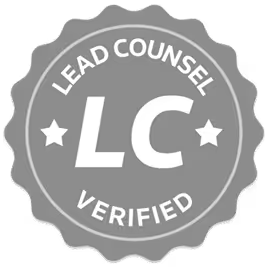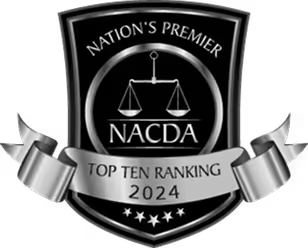White-Collar Cases We Defend in Hall County
At Blake Poole Law, we defend professionals, business owners, and executives against all white-collar criminal charges throughout North Georgia. Many of these crimes involve state law violations and federal law violations, with both state prosecutors and U.S. Attorneys from the Justice Department involved. These complex prosecutions require an equally sophisticated defense, with our exclusive criminal defense focus and unique prosecutorial and judicial experience providing the edge you need.
Georgia White-Collar Crime Penalties
White-collar convictions in Georgia carry consequences far beyond traditional criminal sentences. Understanding the full scope of potential penalties helps inform critical early decisions in your defense.
Sentencing Guidelines and Mandatory Minimums
Georgia white-collar sentences vary dramatically based on loss amounts, victim numbers, and aggravating factors. While judges retain some discretion in state cases, federal prosecutions often involve mandatory minimums and rigid sentencing guidelines.
Embezzlement penalties depend on the amounts taken:
- Under $1,500: Usually a misdemeanor with up to 12 months in jail
- $1,500-$5,000: 1-5 years in prison
- $5,000-$25,000: 1-10 years in prison
- Over $25,000: 2-20 years in prison
Identity fraud escalates quickly:
- First offense: 1-10 years plus up to $100,000 fine
- Second offense: 3-15 years plus up to $250,000 fine
- Federal charges add consecutive sentences
Money laundering multiplies exposure:
- State charges: 1-10 years per transaction
- Federal charges: Up to 20 years per count
- Asset forfeiture of all involved funds
Financial Penalties Beyond Fines
The financial devastation extends well beyond court-imposed fines:
- Restitution obligations often dwarf fines, requiring repayment of every dollar allegedly taken plus interest and penalties. Bankruptcy cannot discharge criminal restitution, creating lifetime debt obligations.
- Asset forfeiture allows prosecutors to seize property allegedly connected to crimes before conviction. Homes, vehicles, bank accounts, and businesses can be frozen or sold, destroying your ability to fund your defense.
- Cost of prosecution in complex white-collar cases can reach hundreds of thousands of dollars. Georgia law allows courts to impose these investigative and prosecution costs on defendants.
- Civil lawsuit exposure can follow criminal charges. Victims, shareholders, and government agencies can file parallel civil actions seeking damages that can exceed criminal penalties.
How White-Collar Investigations Work in Georgia
White-collar investigations differ fundamentally from typical criminal cases. They begin quietly, often months or years before arrests, as investigators pore over financial records and recruit cooperating witnesses. Understanding these phases helps protect your interests at every stage.
Pre-Indictment Phase
The first sign of trouble might be a target letter from the U.S. Attorney's Office or a grand jury subpoena for documents. This pre-indictment phase offers critical opportunities for experienced counsel to intervene, potentially preventing charges or limiting their scope.
- Target letters formally notify you that you're under criminal investigation. While terrifying, they also open dialogue opportunities. We've successfully convinced prosecutors to decline charges during this phase by presenting exculpatory evidence and legal challenges early.
- Grand jury subpoenas demand document production or testimony. Each response requires strategic decisions on what to produce, what to challenge, and whether to assert Fifth Amendment rights. Mistakes during this phase often provide prosecutors with their strongest evidence.
- Search warrants in white-collar cases typically target business records, computers, and financial documents. Unlike drug cases, these searches often occur at businesses during working hours, maximizing disruption and embarrassment. We help manage these searches to minimize damage while preserving legal challenges.
- Document preservation duties arise immediately upon learning of investigations. Destroying documents, even through routine procedures, can result in obstruction charges carrying a 20-year sentence. We implement litigation holds, protecting you from inadvertent destruction claims.
Federal vs. State Prosecution
The decision between federal and state prosecution often determines case outcomes. Federal prosecutors have vast resources, harsh sentencing guidelines, and high conviction rates. State prosecutors may offer more flexibility but increasingly coordinate with federal authorities.
Federal jurisdiction triggers include:
- Wire transfers crossing state lines
- Federal program fraud (Medicare, PPP loans)
- Tax violations
- FDIC-insured bank involvement
- Interstate business operations
We leverage our relationships with both federal and state prosecutors to influence charging decisions when possible, seeking the forum most favorable to your defense.
Professional Consequences That Destroy Careers
For Gainesville's professional community, criminal convictions end careers built over decades. Beyond imprisonment and fines, white-collar charges trigger cascading professional consequences requiring immediate attention.
License Revocations
Professional licensing boards act swiftly upon learning of criminal charges, often suspending licenses before conviction. Each profession faces unique requirements:
- Healthcare professionals must report arrests to the Georgia Composite Medical Board, Board of Nursing, or other licensing entities within 30 days. Drug-related crimes, Medicare fraud, and patient-related offenses typically result in summary suspension pending investigation.
- Financial advisors face FINRA sanctions, SEC bars, and state licensing actions. Any crime involving "moral turpitude" or financial dishonesty triggers permanent industry exclusion.
- Real estate agents must notify the Georgia Real Estate Commission of any conviction. Crimes involving fraud, theft, or moral turpitude result in license revocation, destroying careers and commission pipelines.
- CPAs and attorneys face disciplinary proceedings from state boards. Bar admission in other states becomes impossible. Even misdemeanor convictions can end legal careers.
Employment Termination
Most professional employment contracts contain moral turpitude clauses that trigger immediate termination upon arrest or indictment. Banks, healthcare systems, and corporations cannot risk retaining executives under federal investigation. Severance packages evaporate, stock options forfeit, and deferred compensation vanishes.
Security Clearance Loss
For the many Gainesville professionals working with defense contractors or requiring security clearances, criminal charges mean immediate suspension. The adjudication process rarely favors those with pending charges, and convictions result in permanent revocation.
Reputation Damage
Unlike drug or violent crimes that may be forgotten, white-collar convictions appear prominently in online searches forever. Professional networks disappear, business relationships end, and social standing crumbles. The internet ensures these consequences follow you permanently.
Common White-Collar Crime Defenses
White-collar prosecutions rely on complex financial evidence and cooperating witnesses. This complexity creates defensive opportunities unavailable in simpler criminal cases.
Lack of Criminal Intent
Most white-collar crimes require proof of specific intent to defraud or deceive. Business failures, accounting errors, and good-faith disputes don't constitute crimes without criminal intent. We distinguish between poor business judgment and criminal conduct.
Good Faith Defense
Ignorance of a particular law is never a valid defense. But if a defendant can prove they honestly believed their actions were legal and they had no intent to defraud, this "good faith" defense could potentially negate the element of specific intent required for a fraud conviction. For example, reliance on professional advice, industry customs, or reasonable interpretations of complex regulations can be part of the defense strategy to negate criminal intent. We document the legitimate business reasons behind challenged transactions.
Reliance on Professional Advice
Following counsel from attorneys, accountants, or compliance professionals provides a powerful defense. We establish paper trails showing you sought and followed professional guidance, negating willfulness requirements.
Statute of Limitations
White-collar prosecutions face strict time limits — generally five years for federal charges, but there are exceptions. For example, mail fraud, wire fraud, bank fraud, and conspiracy to commit a federal crime have a 10-year statute of limitations. Prosecutors often attempt to extend these shorter time limits through conspiracy theories or continuing offense doctrines. We attack stale prosecutions every chance we get.
Constitutional Violations
Fourth Amendment violations in document seizures, Fifth Amendment violations in interrogations, and Sixth Amendment violations in grand jury proceedings all can provide grounds for suppression or dismissal. The length and complexity of white-collar investigations multiply opportunities for government overreach. We take advantage of that overreach whenever possible.
Insufficient Evidence
Prosecutors must prove every element of the charged crime beyond a reasonable doubt. In document-heavy white-collar cases, we exploit gaps in paper trails, missing witnesses, and ambiguous evidence. Complexity becomes the enemy of proof beyond a reasonable doubt.
The Paper Trail: How Prosecutors Build Cases
Understanding how prosecutors construct white-collar cases helps identify weaknesses and build stronger defenses. Unlike street crimes, which usually rely on eyewitnesses, white-collar prosecutions depend on documents.
Financial Records Analysis
Prosecutors employ forensic accountants to analyze years of financial records, seeking patterns suggesting fraud. Bank statements, tax returns, business records, and accounting files undergo microscopic examination. We counter with our own experts' challenging interpretations and exposing alternative explanations.
Email and Electronic Communications
Every email, text, and electronic communication becomes potential evidence. Prosecutors take communications out of context, spinning innocent business discussions into criminal conspiracies. We restore context and demonstrate legitimate purposes behind challenged communications.
Witness Cooperation
Former employees, business partners, and co-defendants often cooperate for leniency. These witnesses face enormous pressure to embellish or fabricate to satisfy whatever deal they made with prosecutors. We expose these motivations to lie and any inconsistencies in cooperating witness testimony, which can destroy their credibility.
Expert Testimony
Complex financial crimes require expert testimony to explain transactions to juries. Prosecutors rely on government experts with built-in biases. We present renowned experts who provide balanced analysis and challenge prosecution theories.
Pre-Trial Strategies in White-Collar Cases
The lengthy investigation periods in white-collar cases create unique pre-trial opportunities. Success often comes not from trial victories but from preventing charges or negotiating favorable resolutions before trial.
Negotiating with Prosecutors
Early engagement with prosecutors can shape charging decisions. We present exculpatory evidence, legal challenges, and mitigation factors before indictments are sought. Prosecutors appreciate avoiding lengthy trials when presented with compelling defense packages.
Pre-Trial Diversion Programs
Federal and state prosecutors increasingly offer pre-trial diversion for first-time offenders. These programs allow charges to be dismissed upon completion of requirements. We negotiate for inclusion in these programs when available.
Deferred Prosecution Agreements
Corporate defendants and individuals may negotiate deferred prosecution agreements to avoid conviction. These agreements require cooperation, compliance programs, and monitoring, but preserve professional licenses and avoid criminal records.
Civil Resolution Options
Some matters can be resolved through civil settlements, avoiding criminal prosecution altogether. Payment of taxes, regulatory penalties, or restitution may satisfy government interests without criminal charges. We explore every avenue that could avoid criminal prosecution.
Protect Your Professional Reputation and Future
Former prosecutor Blake Poole and former judge Matt Leipold understand white-collar prosecutions from every angle. Call now for immediate defense.






















.avif)
